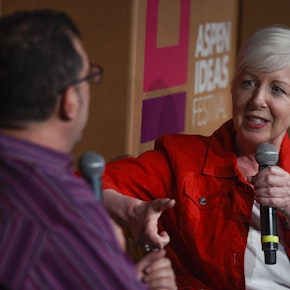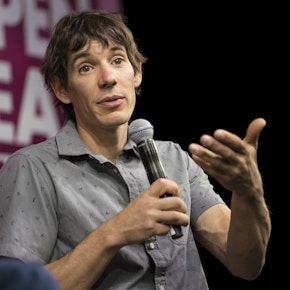Explore
Sessions

Dan Porterfield, Margaret Low, and Peggy Clark kick off Aspen Ideas: Health. This session also features Big Ideas from Health presenters.

The 3rd annual Spotlight Health is a deep-dive into issues around health, and it’s a momentous time for health. It’s becoming easier to alter human genes, and the Zika epidemic continues to impact an increasing number of people. What’s being done to detect and respond to outbreaks like Zika? Are we combining science with values, and technology with humanity? How is pl...

The upcoming US presidential election is likely to have significant implications for health and health care. On the domestic front, the choice could influence efforts to overhaul the Affordable Care Act, reform Medicare, prepare for natural and manmade emergencies, and support cutting-edge research at the National Institutes of Health. Globally, funding for pandemic respon...

Health care never stops engendering political debate. Ten states have asked the federal government for the right to impose work requirements on some individuals receiving Medicaid, insurance premiums are expected to rise again this year, and the Affordable Care Act continues to provoke legislative and judicial action. How will all of that influence the upcoming election? L...

Life expectancy at birth for the total US population did not change between 2013 and 2014, according to a recent report from the CDC’s National Center for Health Statistics. But that overall finding masks something unexpected: white, non-Hispanic women actually saw their life expectancy decline. While the drop was small (0.1 years), it stands in contrast to most other majo...

Data from a 2007 voluntary research scan helped Steven Keating identify his own brain tumor in 2014 when he began to notice a phantom vinegar scent. After an MRI confirmed the presence of a tennis ball-sized tumor, Keating immediately began collecting his own clinical, research, and self-generated data. Armed with 200 gigabytes of information, he was better able to underst...

The average annual cost of cancer drugs in the US now exceeds $100,000 and the price of more than 200 generic drugs doubled from 2013 to 2014. That puts them far out of reach for countess ailing people, including many with decent insurance. The industry argues that it needs the revenue for the complex and expensive research that leads to better treatments, but pharmaceutic...

On June 3, 2017, Alex Honnold became the first person to climb the 3,000-vertical-foot granite face of Yosemite’s El Capitan, alone, without ropes, a feat that was chronicled in the Academy Award-winning documentary, Free Solo. In his New York Times op-ed column, Bret Stephens wrote that with that act, “Honnold gave an extraordinary gift to everyone who believes that the l...

Can we end the HIV epidemic in the next five years? President Trump pledged in February to do just that, but it will take vigorous research, aggressive outreach, new global commitments, better access to evidence-based treatment, attitude changes — and resources. Although the viral infection has drawn less attention in recent years, some 37 million people still live with HI...

As secretariat of the UN Framework Convention on Climate Change, Costa Rican diplomat Christiana Figueres led the global adoption of the Paris Agreement in 2015. But she was not always so hopeful, and recalls a turning point as she consciously shifted her attitude from despair to stubborn optimism. Jeff Goodell, author of The Water Will Come sits down with Figueres to reve...

The United States health system falls short, bluntly declares the Commonwealth Fund in its recent report, “Mirror, Mirror 2017: International Comparison Reflects Flaws and Opportunities for Better US Health Care.” The study compares the US to ten other high-income countries. The US is by far the top spender, but sinks to the bottom when it comes to measures of outcome, acc...

If we are lucky enough to reach age 85, we face a 25 percent chance of dementia, and the odds worsen with time. Some 50 million people worldwide were living with dementia in 2017, and that number is predicted to double every 20 years so that by 2050, the afflicted population will reach 132 million. The most common cause is Alzheimer’s disease, an invariably progressive con...

The crisis of loneliness poses as grave a threat to public health as obesity or substance abuse. It cuts across generations and reaches around the world. Katie Hafner calls it “a quiet devastation” and the poet Emily Dickenson writes that it is “the horror not to be surveyed.” Millions of people live with sparse human contact and research tells us that lonely people are mo...

Private equity firms are using leveraged buyouts, venture capital, and other funding sources to acquire hospitals, clinical practices, nursing homes, and other health-related businesses on a grand scale. In 2021, they poured more than $200 billion into the sector, compared to $41 billion in 2010. Investors claim their capital will expand access to care, drive innovation, f...

Responsibility for implementing the Affordable Care Act (ACA), in line with Congressional intent, rests with the US Department of Health and Human Services (HHS). The 21st secretary of HHS, Kathleen Sebelius, discusses the impact of the law since it was passed under her watch in 2010. She'll also talk about the provisions Congress might alter, the extent to which the execu...

The Affordable Care Act became law because five congressional leaders made it happen. These committee chairs — two from the US Senate, three from the House of Representatives — share the stage to talk about the passage, impact, and future of the ACA. As the law’s key architects, all five bring insider knowledge of the maneuvering, negotiation, and compromise that led to it...

Dick Metcalf has been shooting since kindergarten, a member of the NRA since middle school. He’s been studying, writing, and teaching about firearms for over 40 years. But Metcalf’s long career as a columnist with Guns & Ammo magazine came to an abrupt halt in late 2013 after he penned a column that explored the line between firearm regulation and Second Amendment infring...

On any given day, dedicated scientists at the federal Centers for Disease Control and Prevention (CDC) are promoting childhood vaccines, advancing disease prevention, tamping down on food-borne illnesses, tracking microbial outbreaks around the globe, collecting data on drug overdoses and tobacco use, and conducting research in 200 laboratories. In March 2018, after 20 yea...

Polio is likely to be wiped off the planet in the next two years, a huge triumph for global health. Seventy-four cases of polio were reported in 2015, in contrast to 350,000 when eradication efforts began in 1988. Although polio remains endemic in Afghanistan and Pakistan, there is now a push towards the finish line, with creative strategies in place to attract religious l...

The Healthy Hunger-free Kids Act, passed in 2010, was the first major nutrition update to school meals in decades. Public school lunches now offer more vegetables, less sodium, less sugar, and fewer empty calories—a major victory for nutrition advocates in the battle against childhood obesity. But kids miss the empty calorie foods and many schools are finding the programs...

